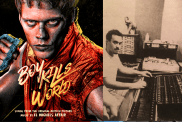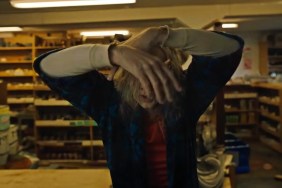
Welcome to Target Practice, where we here at Shock take a look at the output of Arrow Films. Arrow has brought the best in horror, cult and exploitation repertory titles into UK homes since 1991. Now theyve finally crossed the Atlantic, delivering genre stalwarts and oft-overlooked gems via beautiful Blu-ray & DVD editions.
The fourth installment in this ongoing cult chronicle is a pair of early Jack Hill pictures: Spider Baby (1968) and Pit Stop (1969)

The Films
Jack Hills Spider Baby is a bridge between a cinematic Old World (read: the dark house spook fests of William Castle and Hitchcocks Psycho), and a new, taboo-pushing style of cheapo exploitation, ushered in by the likes of Herschell Gordon Lewis (Blood Feast). Its a cannibal movie thats lurid, yet undeniably chaste and bloodless, opting to establish a microcosm of unconditional love that the Merrye Family enjoys inside of their dilapidated, hilltop mansion. From the jokey, animated opening credits of his first solo authorial effort, Hill is signaling that his tongue is firmly in cheek; paying homage to history (right down to the casting of B-Movie legend Lon Chaney, Jr. as patriarch/caretaker, Bruno), while also establishing his own fish tank brand of filmmaking. Predating Tobe Hoopers Texas Chain Saw Massacre by nearly a decade, the severity of that blown out nightmare is never present. Ostensibly the most playful cannibal picture ever produced, Hills vision is more focused on the ways bonds are bolstered against disease, outsiders and the ravages of time itself, all while chuckling along to its own black-hearted jokes.
Shot in twelve days during the summer of 1964, Spider Baby was produced mere weeks after both The Munsters and The Addams Family premiered on prime-time TV. Funded by two real estate developers (Gil Lasky and Paul Monka) who wanted to break into the film industry, Hill was allotted $80,000 to film his own monster family story. Theres an overt goofiness and referential quality to the proceedings that places the movie in league with these mainstream smashes (not to mention Sid Haigs bald visage acting as a Fester stand-in). But Hill is interested in cinema, not television, draping each corner of the Merrye estate in dark shadows, from which giant tarantulas can crawl. Theres an air of forbidden sexuality that permeates every frame, as sisters Elizabeth (Beverly Washburn) and Virginia (Jill Banner) roam the halls like lost brides of Dracula, and Aunt Emily (Carol Ohmart) begins to embrace her own inner vamp.

The cast for this cheapie is phenomenal, and makes you completely forget the movies meager beginnings. Haig is hamming it up and having a ball as Ralph, the tragic victim of Merrye Syndrome, a condition that causes one to mentally regress beyond infancy into a pre-natal state of primal cannibalistic urges. Chaney brings an incredible amount of pathos to Bruno, lending the movie a beating, sympathetic heart it wouldnt possess otherwise. Washburn and Banner (who, at seventeen years of age, changed her name to avoid California labor laws) embrace being walking jailbait pinups, quick to slice and dice snoops with wide-eyed ferocity. Like Chaney, Ohlmart connects Hills picture to the old school horror its partially paying tribute to, having already appeared in House on Haunted Hill. Dementia 13 player Karl Schanzer slaps on a Hitler mustache as the inquisitive and uppity lawyer, Schlocker. Together, these thespians congeal to create a black box theaters worth of oddity, each and every one allowed to create strange, unique characters that sear themselves into a viewers psyche.
Sadly, Spider Baby would be lost for years thanks to California economic strife. Just as post-production was coming down the home stretch, the real estate market crashed, causing Lasky and Monkas assets to become frozen in legal disputes. Audiences wouldnt see the film until 1968, when director/distributor David L. Hewitt purchased the rights to the picture and re-named it (from original title, Cannibal Orgy), slapping the feature onto a double bill with his own Dr. Terrors Gallery of Horrors. The movie failed miserably at the box office and vanished completely for almost two decades. Suddenly, The Maddest Story Ever Told became The Saddest Story Ever Told, even as Hill went on to helm lo-fi WIP and Blax classics like The Big Bird Cage and Foxy Brown. It wouldnt be until the mid to late 80s that the film would finally surface on (legal) VHS, followed by revival 35mm screenings in Los Angeles. For most modern genre fans, the legend of Spider Baby lives on via the output of Rob Zombie and Quentin Tarantino, both of whom have cited Hills work as a key influence, going as far as to cast Sid Haig in their own filmic endeavors.

At the end of Monte Hellmans 1971 masterwork, Two-Lane Blacktop, the Driver and Mechanics Chevy speeds off toward the end of a Tennessee airstrip, concluding their final drag race as the film literally burns up in the projector. Its a symbolic gesture on the part of Hellman as broad and bluntly beautiful as anything that came before during the movies one hundred minutes. This era will drift into the next; its symbols disintegrating along with the hope that the period would be better (or any more meaningful) than the last. We dont need to see the end, because weve already lived through a different version of the same exact existential nothingness. In a way, Jack Hills Pit Stop is this pictures spiritual precursor a tale of twisted metal, fragile flesh, and the men who exploit the two for their own gain. Willingly subjecting themselves to this dirt-smeared Hellhole of blood and steel is a godless rogue (Richard Davaols) and his wily, wounded competitor (Sid Haig), both out to prove themselves man enough to survive a figure-eight arena of annihilation.
When Hill discussed the potential of making Pit Stop with producer Roger Corman, Corman simply requested he make a stock car picture. Hill replied that he wanted to make an art film. To which, Corman advised, do both. But while there are hints of loose New Wave framing to be found within the movies stark, black and white compositions, Hill never looses sight of the fact that hes delivering a product for the moneymen. Where Hellman would famously zig when Corman expected him to zag (resulting in the infamous Joe Dante re-edit of Cockfighter into Born to Kill), Hill still provided a crowd pleasing mix of nihilistic car crashes that, over forty-five years later, are incredibly visceral (utilizing virtually zero stock footage). Hill gets you down on the track with these two-fisted psychos, as they rub against one another, unafraid to careen their cars into a minefield if it means crossing the finish line first. It takes a certain type of icy-veined lunatic to get behind the wheel in this sleazy subculture, and Hill aptly defines just how deadly these matches become.

Conversely, a certain type of woman is necessary to love these high octane Neanderthals. Jolene (Beverly Washburn) knows that there are a dozen guys like Rick Bowman (Davalos) coming on and off of this racetrack every year. His James Dean swagger has to be cranked to its maximum level in order to finally convince her to hop into bed with him. Ellen McLeod (Ellen Burstyn) is the dutiful mechanic wife to her driver husband, Ed (George Washburn), able to pinpoint every single part of the engine on her mans car. Yet she never oversteps her bounds, in order to keep him sharp and macho for when he heads out onto the eight. Theres an undercurrent of butch feminism to Hills script, as he layers in tiny moments for these women to shine soulful compliments to their brainless, brawny counterparts. Its a marvel of defining character through minor action (or, in Ellens case, inaction), as Hill then fills all of these characters mouths with sparse, endlessly quotable dialogue.
Theres a suicide born every day, says racing sponsor Grant Willard (Brian Donlevy) to a somewhat bewildered announcer and, in the end, this seems to be the running theme of Hills art house racing movie. Pit Stop is an exploitation film about exploitation; the ways men with money pinpoint a youth friendly subculture and then milk it for every bloody dime its worth. All of these animals behind the wheel are disposable; bags of flesh to be crushed inside of their tin cans. But it doesnt matter Willard will replace them with the next sucker who needs a cheap thrill and a couple bucks in his pocket. Much how Hellman warns us that existence will simply keep stretching past his film and even our own lives, Hill is fascinated by a cycle of greed, chewing up and spitting out those foolish enough to buy into the faux fame it offers. Pit Stop is the directors masterpiece; not only because its a thrilling genre movie, perfectly shot and edited, but also because it speaks to a timeless callousness that continues on into oblivion. There is no God. There is no afterlife. All you have is the pride earned and the money these hawks allow you to keep. Memories will fade, just as the dirt washes off of your leather jacket at the end of a twenty-lap circuit. Deal with it, and move on to the next.

The Discs
Arrows delivered a pair of stunning black and white transfers, the picture quality alone qualifying these discs as must owns. The grain is accounted for, and there is some minor print wear here and there, but the edges are sharp and the blacks are incredibly deep. Ditto the original mono soundtracks that are included for each feature the engines in Pit Stop and the shrieks during the finale of Spider Baby both loud enough to split your eardrums. This is restoration work at its finest, presenting two nearly forgotten classics, as they should be viewed.
The extras on both discs provide a wealth of insight into Jack Hills workmanlike creative process. A Pit Stop commentary moderated by Hill authority Calum Waddell is absolutely killer, outlining not only the films Corman genesis, but also the many speed bumps the production encountered. Hill himself takes you back to the original Merrye House for Spider Baby, as well as sitting on a 2012 Film-to-Film panel at the Academy of Motion Picture Arts and Sciences with stars Quinn K. Redeker and Beverly Washburn. There are the usual trailers and behind the scenes featurettes (as is customary on these deluxe treatment Special Editions), but perhaps most interesting is the inclusion of Hills UCLA short film, The Host, which features a young Sid Haig and was (in)famously barrowed from by classmate Francis Ford Coppola for the re-jiggered ending of Apocalypse Now. Rounding it all out are stellar contextualizing essays by critics Glenn Kenny and Stephen R. Bissette, providing astute observations. As usual, this is magnificent work from Arrow, who might very well be the best home video line in operation at the present moment.

—
Jacob Knight is an Austin, Texas based film writer who moonlights as a clerk at Vulcan Video, one of the last great independent video stores in the US. You can find find him on Twitter @JacobQKnight.








